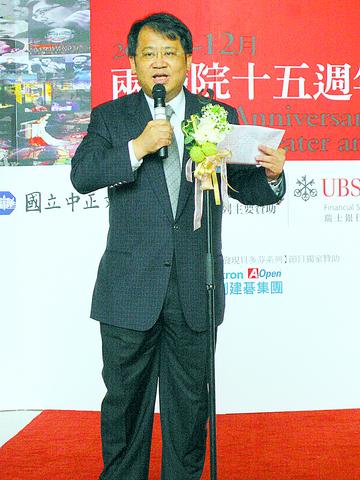On Oct. 31, the National Concert Hall and the National Theater will turn 15. At a press conference last Tuesday, Chiang Kai-shek Cultural Foundation director Ju Jung-ching
Ju, the director of Taiwan's most highly regarded percussion ensemble who took over management of the National Theater and Concert Hall last year, said that an important aim of the nation's premier performance venues was to bring down the entry barrier for the appreciation of the arts. "It is for this reason that we have brought in corporate sponsorship for some events," he said, pointing primarily to the Jose Cura and Kathleen Battle recitals in November, where premium seats will be available for only NT$2,500 and prices going as low as NT$400. The event is being sponsored by the Delta Foundation (
Saying that he did not want to upset proceedings, he gained vocal support from an audience that included many of Taiwan's top performers when he pointed out that the corporate support that the CKS Cultural Foundation was so loudly promoting was only going to high-profile classical music concerts, with absolutely nothing for drama. Although ticket sales for The Aurora Borealis (

PHOTO: IAN BARTHOLOMEW, TAIPEI TIMES
In line with lowering the entry barrier for people who might not generally be regular theater-goers, a number of big shows have been scheduled for outdoor spaces around the theater and concert hall. This will include a massive outdoor performance of ketsai opera by the Ming Hwa Yuan Taiwanese Opera Company (明華園). Chen Sheng-fu (陳勝福), the president of Ming Hwa Yuan, promised to draw 200,000 for a free outdoor concert scheduled for Oct. 31, in a display of bravado that is well backed up by the company's strong commercial record. Overall, for indoor performances, CKS public relations chief Liu Jia-yu (劉家渝) said that there were at total of 120,000 tickets to be sold for the three month season of 107 performances.
In addition to Jose Cura and Kathleen Battle, the other major imported acts include a visit by cello virtuoso Misoslav Rostropovich (Sept. 7), the first and third groups of the Nederlands Dans Theater (Oct. 11-13 and Oct. 25-27) and the Choir of Westminster Abbey (Oct. 27). High-profile local premiers include Smoke by the Cloud Gate Theater and in the minor league, the launch of the Zhu Lu-hao Traditional Chinese Theater Company (朱陸豪京劇團), in which famed comedian Sung Shao-ching (宋少卿) in what is being billed as "new Chinese comic opera" (Oct. 17-20) and She is Walking, She is Smiling, by Performance Workshop directed by Chin Shih-jie (金士傑). On the music front, the National Symphony Orchestra, under Chien Wen-bin, will perform the complete Beethoven symphonies and piano concerti in five concerts in September.
Tickets are already on sale, and for the major events are selling well. More information about events can be found on the Web at http://www.ntch.edu.tw.

In the March 9 edition of the Taipei Times a piece by Ninon Godefroy ran with the headine “The quiet, gentle rhythm of Taiwan.” It started with the line “Taiwan is a small, humble place. There is no Eiffel Tower, no pyramids — no singular attraction that draws the world’s attention.” I laughed out loud at that. This was out of no disrespect for the author or the piece, which made some interesting analogies and good points about how both Din Tai Fung’s and Taiwan Semiconductor Manufacturing Co’s (TSMC, 台積電) meticulous attention to detail and quality are not quite up to

April 21 to April 27 Hsieh Er’s (謝娥) political fortunes were rising fast after she got out of jail and joined the Chinese Nationalist Party (KMT) in December 1945. Not only did she hold key positions in various committees, she was elected the only woman on the Taipei City Council and headed to Nanjing in 1946 as the sole Taiwanese female representative to the National Constituent Assembly. With the support of first lady Soong May-ling (宋美齡), she started the Taipei Women’s Association and Taiwan Provincial Women’s Association, where she

Chinese Nationalist Party (KMT) Chairman Eric Chu (朱立倫) hatched a bold plan to charge forward and seize the initiative when he held a protest in front of the Taipei City Prosecutors’ Office. Though risky, because illegal, its success would help tackle at least six problems facing both himself and the KMT. What he did not see coming was Taipei Mayor Chiang Wan-an (將萬安) tripping him up out of the gate. In spite of Chu being the most consequential and successful KMT chairman since the early 2010s — arguably saving the party from financial ruin and restoring its electoral viability —

It is one of the more remarkable facts of Taiwan history that it was never occupied or claimed by any of the numerous kingdoms of southern China — Han or otherwise — that lay just across the water from it. None of their brilliant ministers ever discovered that Taiwan was a “core interest” of the state whose annexation was “inevitable.” As Paul Kua notes in an excellent monograph laying out how the Portuguese gave Taiwan the name “Formosa,” the first Europeans to express an interest in occupying Taiwan were the Spanish. Tonio Andrade in his seminal work, How Taiwan Became Chinese,